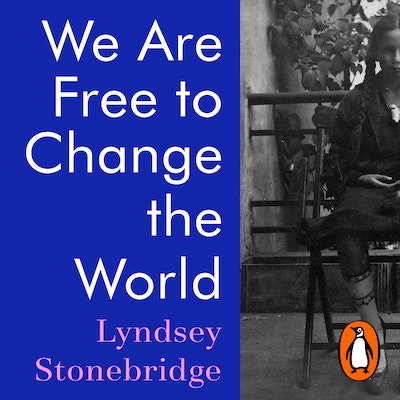- Published: 25 January 2024
- ISBN: 9781529904079
- Imprint: Vintage Digital
- Format: Audio Download
- RRP: $29.99
We Are Free to Change the World
Hannah Arendt’s Lessons in Love and Disobedience
- Published: 25 January 2024
- ISBN: 9781529904079
- Imprint: Vintage Digital
- Format: Audio Download
- RRP: $29.99
An exhilarating, brilliant and utterly original read; an iconic 20th century figure brought to life in all her facets, splendours and complexities
Philippe Sands, author of East West Street
A passionate, original defence of the politics of thinking, and especially of women thinking in public, We Are Free to Change the World is witty, moving and inspiring, at once fiercely angry and a work of deep moral wisdom
Sarah Churchwell, author of Behold, America
In this this brilliantly imagined and compulsively readable book, Lyndsey Stonebridge reveals how Hannah Arendt’s life and thought across the twentieth century matter to our own time – how she dramatised the interplay of love and loneliness, teaching us how not to miss what is under our noses, and that no freedom survives without the presence of others. For its contemporary relevance and exquisite prose, this is a breathtaking triumph
Samuel Moyn, author of The Last Utopia
Both a warmly engaging intellectual biography and a tract for the times, this is a needful reminder of what political thinking looks like when it is humane, literate and radical all at once
Rowan Williams, former Archbishop of Canterbury
Expertly analysed and beautifully written, Stonebridge on Arendt is a rare gem, combining complex history and stark contemporary resonance with sparks of hope that we really are free to change the world
Baroness Shami Chakrabarti, author of On Liberty
A bold and exhilarating book. It sparkles with ideas and plumbs new depths in the great Hannah Arendt’s thinking. Stonebridge brilliantly brings our own troubled times and Arendt’s face-to-face with one another to wake us into urgency and into greater appreciation of an iconic woman
Lisa Appignanesi, author of Mad, Bad and Sad
In this extraordinary book, Lyndsey Stonebridge details the life and thought of Hannah Arendt in ways that speak to our troublesome times. We get a sense of the expansiveness of Arendt’s thought - her vulnerabilities and her complexity - with stories and intimate details that reveal Stonebridge’s love of her. Beautifully written, We Are Free to Change the World is biography at its best
Eddie Glaude, author of Begin Again
An invigorating and fresh invitation into the world of Hannah Arendt. Stonebridge's accessible and thoughtful writing allows the reader to glide into a complex engagement with ease and joy
Sarah Schulman, author of Let the Record Show
We Are Free to Change the World lightens both the darkness of the times we live in and the burdens we carry on our shoulders. Both serious and joyful, readers of this wonderful book will think and laugh
Jerome Kohn, Trustee, Hannah Arendt Blücher Literary Trust
A splendid, ever-so-timely consideration of Arendt and her thoughts on how nations sink into tyranny
Kirkus, *Starred Review*
Lyndsey Stonebridge walks the world in Hannah Arendt’s footsteps, reaching back a hand to bring us along. One feels Arendt is still with us, still commenting on events, still cross, ironic, or ebullient, still brilliant, but also always a person... A brilliant and wonderful book
Bonnie Honig, author of Public Things
This is a book filled with luminous insights not just into Hannah Arendt but into the moral challenges of our times
Jewish Chronicle
An absorbing new biography… Stonebridge does an admirable job… She imagines her way into Arendt’s life, in places literally retracing her subject’s footsteps, sensing the climate and smelling the (typically smoke-filled) air in an effort of understanding
Economist
Scintillating and always bracing... A gripping book.… presenting us with a Hannah Arendt who is all too human
Literary Review
Compelling and original
Observer
Invigorating and insightful… An exhilarating and thoroughly humanising portrait of one of the most important philosophers of the 20th century… With impressive clarity and infectious passion, she follows the currents of Arendt’s thought to a rousing conclusion
Financial Times
Arendt teaches us here, there is power in our capacity to love… In We Are Free to Change the World, Stonebridge paints a tender picture of Arendt as a person not just a brilliant mind… I think you have to know what love is, too, to write a biography as beautiful and intimate, if not flawless, as this one
Theos Think Tank
A timely and magisterial biography… A critically important overview of Arendt’s life and thought
Irish Times
From Arendt’s life and work Stonebridge fashions a map for navigating our present-day struggles and concerns
Times Literary Supplement
Erudite and passionate... A superb read
Maria Popova, The Marginalian


